Step Right Up and Spin the Wheel
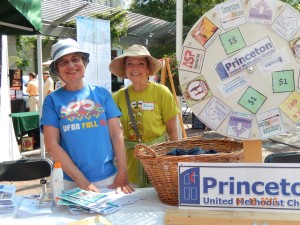 Though it was 100 degrees in the shade, PUMC’s Growth Committee took its message “Help Us to Help Others” to the Princeton Regional Chamber’s “Plaza Palooza” networking event on July 16. From 4 to 7 p.m. at the Princeton Public Library’s Hinds Plaza, folks “spun the wheel” at the PUMC table.
Though it was 100 degrees in the shade, PUMC’s Growth Committee took its message “Help Us to Help Others” to the Princeton Regional Chamber’s “Plaza Palooza” networking event on July 16. From 4 to 7 p.m. at the Princeton Public Library’s Hinds Plaza, folks “spun the wheel” at the PUMC table.
This was the third year that PUMC’s wooden wheel, crafted by Tim Ewer, had a workout at the chamber’s mid-summer marketing expo. Local businesses (hotels, restaurants, contractors, laywers) gave out all kinds of free stuff, plus a limited number of nonprofit members of the chamber (such as Morven, State Theatre, and Habitat for Humanity) were represented.
Iona Harding prepared the wheel this year to include six charities that the church supports: Womanspace, Crisis Ministry, Appalachia Service Project, Cornerstone Community Kitchen, and United Front Against Riverblindness, with its sister organization, Women of Abundance. Also staffing the table were Elsie McKee (from Women of Abundance and UFAR), Lindsey Donaldson, and yours truly.
The wheel makes satisfying clicks, and we took the role of carnival shills. “Step right up and spin the wheel,” we called, “wherever it stops, there’s where your money goes.” We told the spinners about the charity they “won” and they were invited to contribute $1 to it. If it stopped on “Free Gift” they chose from the basket of UFAR T-shirts, cute fabric purses made by FEBA, UFAR bookmarks made by Susan Lidstone, or a bar of chocolate. Everybody went away with a brochure about the charity they “won.” Kids got to spin for free and choose one of the beautiful bookmarks.
We met lots of folks we knew, made many new friends — and were heartened that lots of them already knew about UFAR and Cornerstone Community Kitchen. The word is getting out there!
Barbara Fox
PS: The Growth Committee can use volunteers — as Greeters and as Poster Put-er-upers — and more!. Talk to Iona.
Cornerstone Community Kitchen: One Year Old
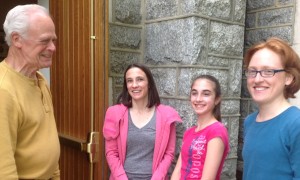
Just inside the doors of Princeton United Methodist Church, on a recent Wednesday, geraniums decorated the red-and-white covered tables, and napkins were tied with matching red ribbons. A dozen volunteers donned aprons and disposable gloves, ready to serve at Cornerstone Community Kitchen, When Emma Glasser arrived, Nicole Oliver, a high school sophomore from PUMC, showed her how to serve the trays – entrees and vegetables from the Trenton Area Soup Kitchen, plus a green salad, a fruit salad, juice, bread, and a dessert.
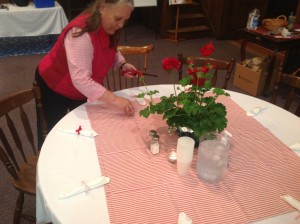
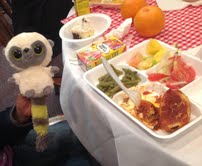
‘Holy Boldness’ Offers Hope in Trenton
“Holy boldness” is the theme at Trenton’s Turning Point United Methodist Church, says Kim Kracman. A PUMC member and a recent graduate of Princeton Theological Seminary, Kim is putting her considerable talents and skills to work at Turning Point (where she teaches Sunday School, among other duties) and at Urban Promise, the Christian youth ministry that runs successful after school programs and summer camps.
The church has a lot of history behind it; it is located at the site that formerly housed the “mother church of New Jersey.” Now it is growing a new and diverse congregation. Kim quotes one of the members as saying that she isn’t worried about going to heaven, because heaven is about people, and “heaven is everybody here.”
Kim offers the opportunity to PUMC members and friends – do you feel called to help in any capacity at either the church or the youth program? Volunteer opportunities are certainly plentiful in Princeton, but some may feel drawn – or called – to one of these opportunities in Trenton.
One of the best parts about the Urban Promise program, says Kim, is that it makes no rigid demands. Whatever an adult can add for an hour, a day, or a weekly visit – that is something extra to benefit the children. “Whatever you have to share, whatever you feel called to do” is what they ask for, she says. “Whatever you can do, the children are sponges for love and affection,” says Kim.
At a recent UMW luncheon Kim was joined by Alison Yearly and Mark Tomkovicz, who told how Thompson Memorial Presbyterian Church in New Hope answered their pastor’s challenge – that all their outreach programs were like a diversified mutual fund, all good things but not one special thing that was really making a difference.
That church decided to rally support for Urban Promise, beginning with the summer camp, where mornings are taught by “street leaders” teenagers who get paid do this job. In the afternoons the teens get their training and volunteer adults take over. The church staffed a week of afternoons and recruited four other churches to staff a week. It invited the children to New Hope for a field trip. One person started a nature camping program and another donated a set of bell chimes for a music program.
The Turning Point church has service opportunities also. It no longer calls its mission committee “Outreach” because it doesn’t want to make a distinction between “us” and “them.” Instead, this committee is called “Christian Formation.” With “holy boldness” as its theme the church ministers to the physical and spiritual needs of the community with monthly grocery distribution, a Saturday breakfast with devotions, a monthly lunch, a clothes closet, a weekly breakfast for women (many homeless), and Wednesday night prayers. It hosts the Monday to Thursday after school Urban Promise program.
PUMC is not a suburban church, set among tract housing. We have committed ourselves to try to use our geographical site, on the corner of Nassau and Vandeventer, to minister to Princeton’s needs. In addition to Cornerstone Community Kitchen’s weekly free meal for the hungry, we have many other service opportunities, those we are fulfilling and those we have yet to fulfill. But some of us – like Kim – may feel called to the work in Trenton.
Visit, she asks. Perhaps you will discern your call.
4th Annual UFAR African Soirée
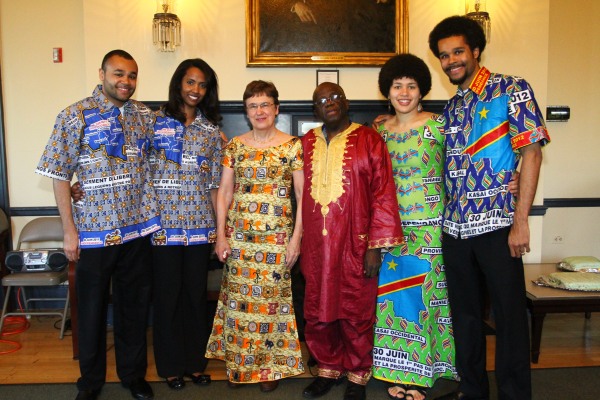
The United Front Against Riverblindness (UFAR) is a non-profit organization led by Executive Director, and Chairman by Dr. Daniel Shungu. UFAR works in partnership with other organizations to combat riverblindness in the Democratic Republic of Congo. Last weekend they held their 4th annual African Soirée, which is a dinner and auction, to raise funds for their cause.
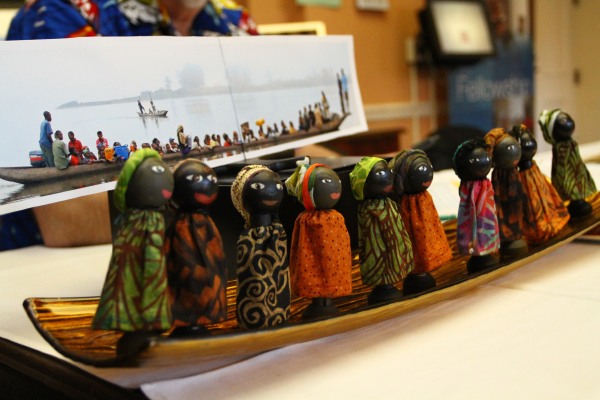
The check-in area already had an African marketplace ambience, with diashikis on racks, shoulder bags and other items for sale. The check-in table had a photo of a war canoe with about 30 people seated on it, and in front of it was a 3D model representing it.

Once inside, teens wearing colorful dashikis passed flavorful hors d’oeuvres. The tablescapes beautifully re-created African villages, each with a mini thatch roof hut in the center and wooden female figures surround it. Everyone received a hand-crafted figure as a gift.
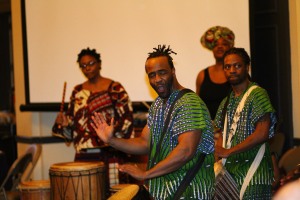
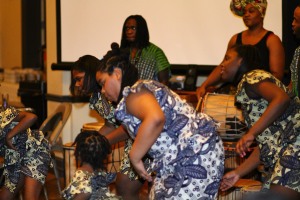
Drummers and percussionists from The Garvey School/Egun Omode Shule started playing, and had the audience participating by singing and clapping. Once we got warmed up, female dancers came in ranging from approximately 14 down to five years of age. They all danced perfectly synchronized, including the little ones.
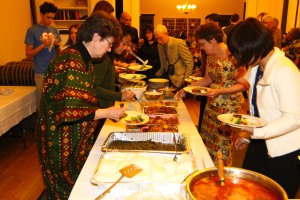
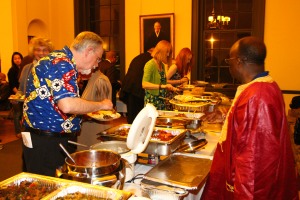
Soon after, the dinner buffet opened. I saw some dishes I’ve never heard of, but did recognize many. Plantains, peanut soup, goat stew, cassava, bitter greens and more were offered. People were buzzing about the new flavors as they tasted the exotic foods.
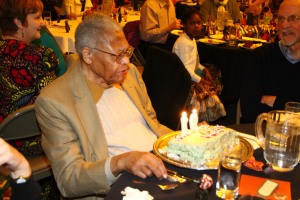

We celebrated former Princeton Township Mayor James Floyd’s 91st birthday with a cake, and another former Princeton Township Mayor, Michelle Tuck Ponder was the auctioneer of the evening. Quilts, artwork, and clothing were auctioned off for the benefit.
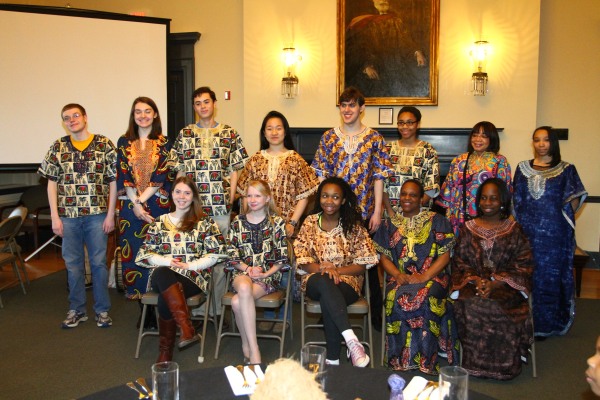
The planning committee consisted of Elsie McKee (below left) and Susan Lidstone (below right), and they did a fabulous job! Overall, it was a wonderful cultural experience for an important cause. I hope to see you there next year!


TASK’s Dennis Micai: Good Report Card
Originally posted on Princeton Comment.
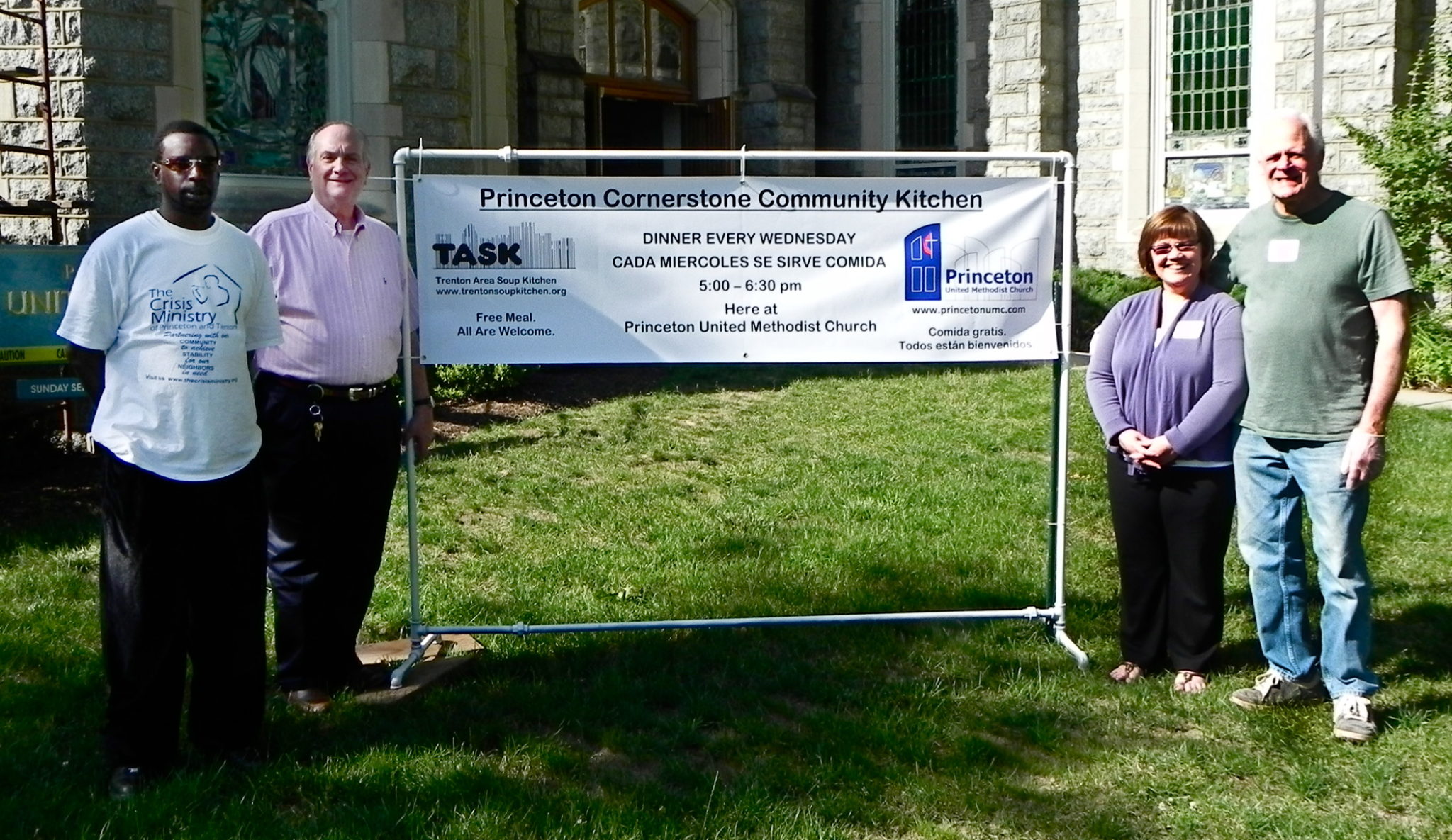
The Trenton Area Soup Kitchen (TASK) gets four stars on the report card provided by Charity Navigator; it earns 69.13 points out of 70. So Dennis Micai, executive director of TASK, will be able to share that good news at a breakfast at Princeton United Methodist Church (PUMC), Nassau and Vandeventer, on Sunday, January 13 at 8 a.m.
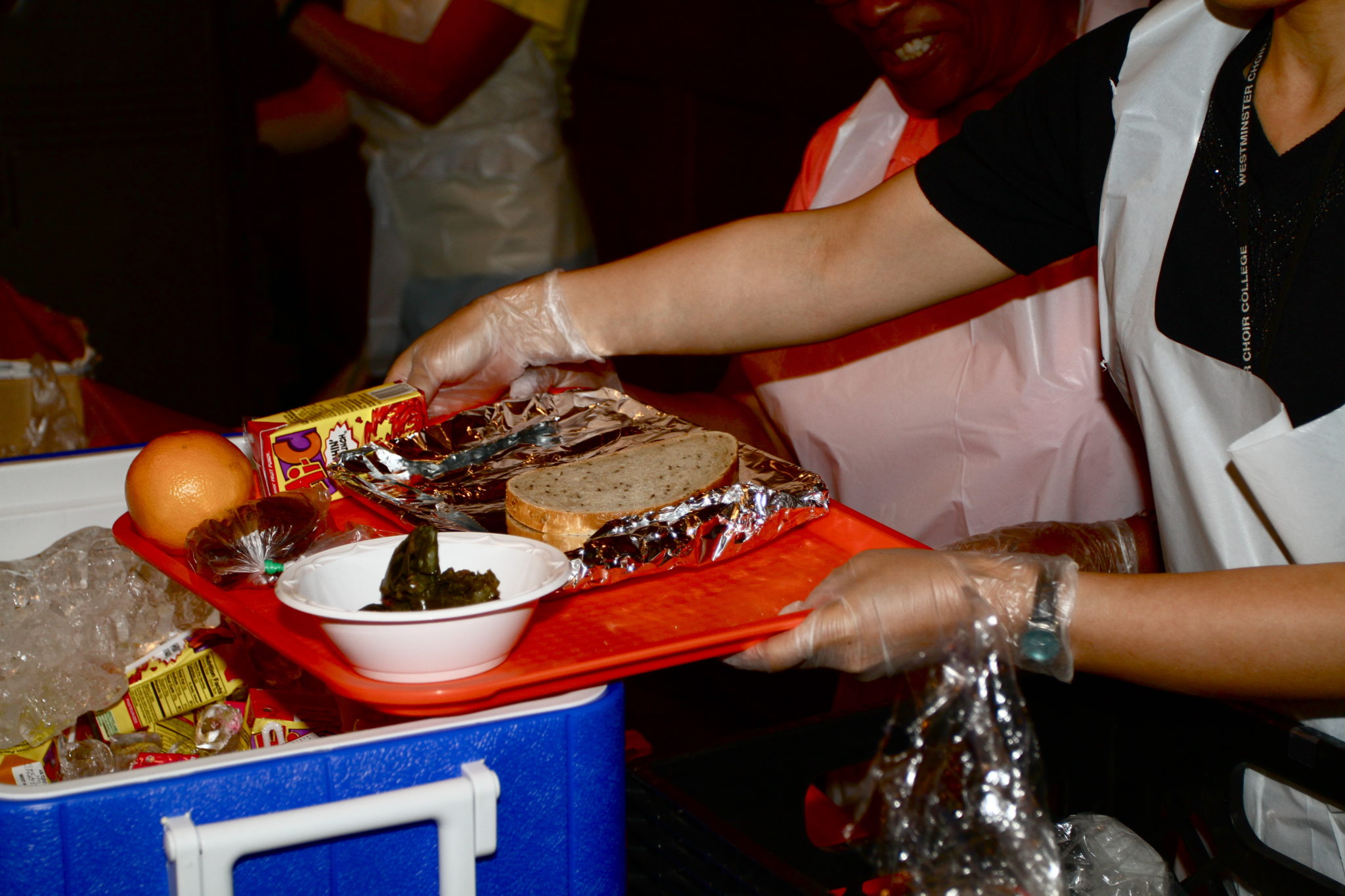 PUMC volunteers have been serving at TASK in Trenton for two decades, but last June the church and TASK began a new partnership to serve meals in Princeton to more than 50 people every Wednesday. Some come for the food, some for the fellowship, and dozens of volunteers from both the church and the community are helping. TASK cooks most of the meals but outside organizations (the restaurant Zorba’s Brother cooked a turkey dinner last month) have also contributed. TASK has a similar partnership in Hightstown.
PUMC volunteers have been serving at TASK in Trenton for two decades, but last June the church and TASK began a new partnership to serve meals in Princeton to more than 50 people every Wednesday. Some come for the food, some for the fellowship, and dozens of volunteers from both the church and the community are helping. TASK cooks most of the meals but outside organizations (the restaurant Zorba’s Brother cooked a turkey dinner last month) have also contributed. TASK has a similar partnership in Hightstown.
TASK offers lots of ways to contribute. So although hunger is a growing problem, Micai will have some good news stories to tell. The breakfast is catered by the United Methodist Men, and all are invited. (Reserve at 609-924-2613 or UMM@princetonumc.org). It will be good to hear some good news for 2013.
TASK has had the four star rating, by the way, for seven consecutive years.
Peter Brown: The Church as “Social Urban Lung”

Originally posted on Princeton Comment.
Diversity is much prized by some Christian congregations, but in recent history it hasn’t always been this way. Churches have been historically the most segregated, divisive groups in America. But in Rome in the period of late antiquity, in the period from the 2nd to the 8th centuries, says Peter Brown, the church promoted the value of diversity.
In a conversation between Brown and Elaine Pagels at Labyrinth Bookstore on Wednesday night. Brown and Pagels discussed Brown’s new Through the Eye of a Needle: Wealth, the Fall of Rome, and the Making of Christianity in the West, published by Princeton University Press. Brown cautioned against “pauperizing” the poor, thinking of poor people as … simply … poor.
Quickly scanning his book, I found Brown’s observation that, in the Hebrew tradition, the poor were not merely beggars: They came to the rich and religious leaders to seek justice and protection. Brown writes (page 77) that the early Christian church viewed the poor, not as ‘the others” but as “our brothers.” (Ironically that is even more true today now that folks who thought they could live in comfort now find themselves in foreclosures. In Princeton there are hidden pockets of need in the most affluent-seeming homes.)
Brown writes (page 87) that wealthy people “valued in the churches a certain lowering of the sense of hierarchy and a slowing down of the pace of competition.” (Just two days before, this is what Roberto Schiraldi seemed to be calling for, when he led a Not in Our Town discussion on the values of “white privilege” at the Princeton Public Library.)
Continues Brown, “Members of the rich often came to the church so as to find there a social urban lung.” That term, social urban lung, describes a place like the Princeton Public Library, which harbored refugees from the power outage, some poor, some wealthy, all equal as they needed warmth and plug-ins. It also describes the house of worship where people can drop their pretensions or inadequacies and “love their neighbor as themselves.’
It has resonance to see what I see happening in my own church, where at the very hour Peter Brown was speaking, the Cornerstone Community Kitchen was serving dinner to a wide variety of people — some who needed the food, some who just wanted to mingle, some who just wanted to “give back” by helping. The good part is, you don’t need to know — and it isn’t visible — to which group a person belongs.
P.S. Come out some Wednesday for the free meal, served in partnership with the Trenton Area Soup Kitchen but definitely not in a soup kitchen atmosphere. You are served by volunteers at an elegantly dressed table (at right), and the meal includes fresh vegetables, salad, and dessert, and there’s even a piano player. It’s every Wednesday, 5 to 6:30, at the Methodist church at the corner of Nassau and Vandeventer, all welcome.
I love Brown’s term, “a social urban lung.”
Princeton’s Good Samaritans Nurtured Community After Superstorm Sandy
Written by Sarah Harris, Barbara Fox, and Robin Birkel

Hurricane Sandy caused havoc in New Jersey. Princetonians suffered downed trees, road closures, power outages, school and business closures, sporadic cell service, and no Comcast or FiOS phone service.
Princeton has long been one of the most wired towns in the nation. So when Sandy hit, and virtually all of Princeton lost power and phone service, lots of people were frantic, not just to notify family members that they were safe, but to conduct business. The next day Princeton United Methodist Church opened its doors. That day, and the entire week, Pastor Jana Purkis-Brash, Music Director Hyosang Park, and church members plugged in the coffee pot and posted a sign on the lawn. It read: Come in! Get warm! Charge and use our wi-fi!

We provided a safe and warm environment for charging cell phones and other devices, staying connected with family and friends, reading, studying, and working. Additionally, we served meals to those not able to cook.

Wednesday, two dozen passersby sought brief refuge from the cold, plus nearly 100 people spent the day. Church members hosted in the Sanford Davis room. Then at 4 p.m. the Cornerstone Community Kitchen team converted it into a dining room. The menu was roast pork, mashed potatoes, salad, and dessert for 73 hungry people.
Thursday, PUMC hosted 75 wi-fi users, everyone from entrepreneurs who stayed all day, to frustrated travelers needing a computer to update their itinerary, to families with children who just dropped by. Some were referred by the Princeton Public Library, which with thousands of visitors daily was having trouble meeting the enormous demand. Even PUMC’s wi-fi had faltered because of too many users, so two more wi-fi nodes were added. We served breakfast, lunch, and another Cornerstone Community Kitchen dinner. This time it was spaghetti for 100 people. At that point, many in Princeton still had no power, and it was getting quite cold.
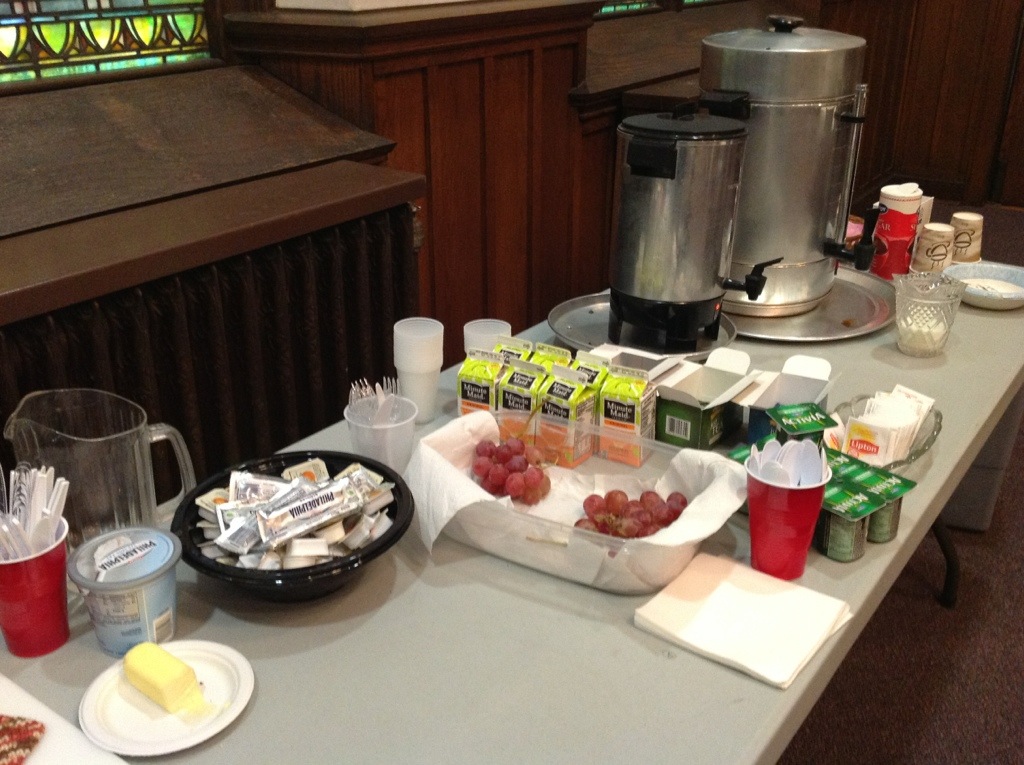
PUMC hosted lunch again on Friday, and breakfast and lunch was offered on Saturday. Of course, all of these services were provided free of charge.
“You imagine that this is what a church should do, but you rarely ever see it done,” said Princeton resident Diana Rhodes, one of the grateful visitors. “What a wonderful service you have provided!”

Meanwhile, outside of the church, PUMCers were living their faith. More than a dozen in the youth group responded to a plea for help to clean the property of a church member living alone. Generators were brought to several families who are vulnerable to the cold, including someone new to the community.
Stoolmacher: Hunger’s Not a Game
Written by Barbara Fox

Feeding the hungry — that doesn’t sound like a fun topic, one that you would like to contemplate over a meal. But at the United Methodist Men’s breakfast at our church on October 14, Phyllis Stoolmacher quoted poignant stats like a politician, dispensed the folk wisdom with the aplomb of a culinary Dr. Ruth, and inspired like a preacher.
Stoolmacher has been the forever-director of the 25-year- old Mercer Street Friends Food Bank, which distributes 50,000 pounds of food a week to some 60 organizations to help feed 25,000 people in Mercer County who don’t have access to enough healthy food.
Some at the breakfast had just taken the food stamp challenge, to live for a week on the meagre amount provided by what is now called the Supplemental Nutrition Assistance Program (SNAP). And the 25-year-old food bank partners with the Trenton Area Soup Kitchen which in turns partners with our church to deliver a weekly Wednesday meal at the Cornerstone Community Kitchen.
I learned new facts and confirmed what I already knew. Federal contribution of commodities has been cut by two-thirds. A family of four can qualify for SNAP if the household income is less than $23,500, and this number does not account for the high cost of living in Mercer County. “It’s not a welfare program,” says Stoolmacher, “and we send our people out into the community with laptops to help people qualify.” Nutrition dollars come on a debit card so nobody can tell whether someone is swiping a credit card or the SNAP card. People stay on SNAP for an average of 9 months.
Restaurants can’t donate because of health issues. Supermarkets do donate, but not prepared food. The state provides funds to buy Jersey Fresh fruits and vegetables. Children who would otherwise go hungry on weekends get sent home with a backpack of easy-to-prepare microwavable meals. Simple recipes go into regular bags of groceries.
It’s best to give dollars rather than canned goods because the food bank can buy in bulk. “You would be surprised at what comes from food drives,” she said wryly, “how much cranberry sauce we get at Thanksgiving and how much matzoh we get in April. Who likes matzoh? I want tuna fish! Give me tuna fish and I am a happy camper.”
What else can we do? Realize that someone you know may be “nutritionally challenged.” Encourage somebody who is looking for work, maybe they’ve run out of unemployment benefits, to sign up for the SNAP program. Or bring them to our Cornerstone Community Kitchen on Wednesdays, from 5 to 6:30 p.m. Nobody knows the difference between the people who come for nutrition or those who come for conversation and companionship. There’s plenty of food on the plates, and there are flowers on the tables.
Some of that food found its way to Princeton via Stoolmacher. She won’t countenance empty or unhealthy calories — not soda, not Gatorade, not ramen noodles, not sweet cereal. Besides tuna fish, her most coveted item is shelf stable milk-in-a-box. “It tastes like real milk.”
At the next United Methodist Men’s breakfast, Sunday, November 11 at 8 a.m., PUMC church member Ed Felten will be the speaker. Reservations at office@princetonumc.com, $5.00.
A version of this post was published on the Princeton Comment blog
Food Stamp Challenge

The congregation was given a food stamp challenge. We were asked to live off the weekly food budget of $31/person, which about $1.48/person per meal. I’ve seen signs around Princeton for people to participate.
This challenge allowed us to understand the struggle that low-income parents have to provide healthy meals for their family, while avoiding hunger. Unfortunately, this isn’t enough for most families, so many must turn to food banks and soup kitchens to steer clear of starvation.
It’s comforting to know that we here at the Princeton United Methodist Church host a community meal on Wednesdays thanks to our Cornerstone Community Kitchen to help those in need in the Princeton area.
Pastor Jana mentioned that we eat in excess, so if we establish portion control, shop wisely, use coupons, stay away from snack foods and specialty drinks (including soda), don’t eat out or get take out, it’s possible to feed your family for $31 per person a day, but it is a real challenge.
Prices can prove to be the biggest obstacle, so you might have to shop around. This means cutting out purchases at Wegman’s and Whole Foods, and look for the best deals at Shoprite or make a trip to Walmart or Aldi’s to help you stay within the budget. The trick is to buy food that’s filling while being nutritious.
This was a difficult challenge, and I think I failed by going over budget a bit to keep my 16 year old athlete from starving. We ate old-fashion oatmeal and raisin bran for breakfast, sandwiches for lunch, and pasta, rice with beans, and soup for dinner.
My favorite meal was a Greek-inspired dish made with giant butter beans in a homemade tomato sauce with onion, garlic, and thyme, topped with a little feta cheese.
Did you take on the challenge? How did you fare?

